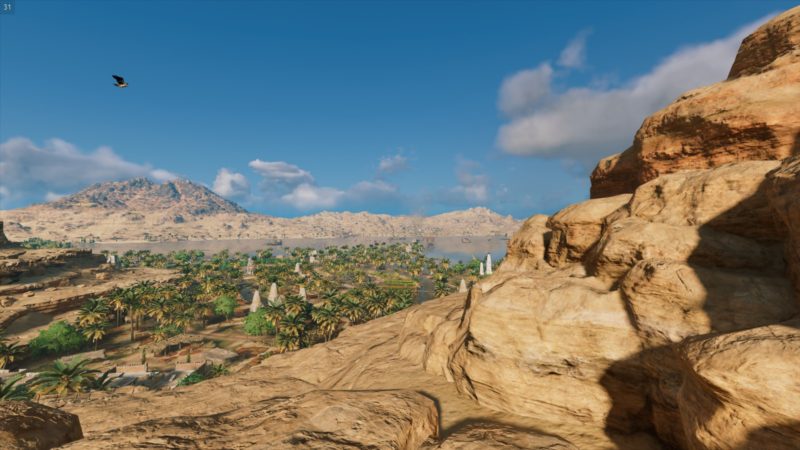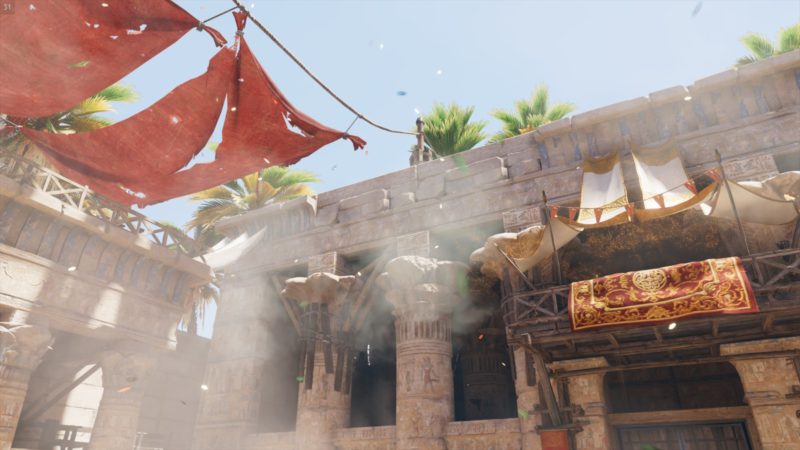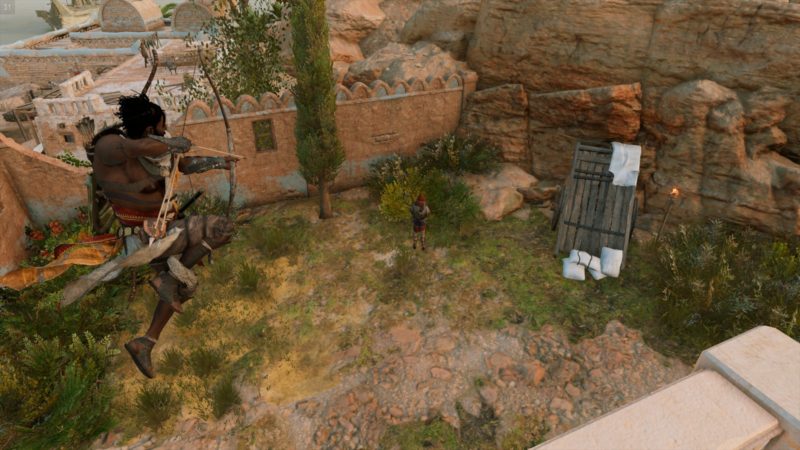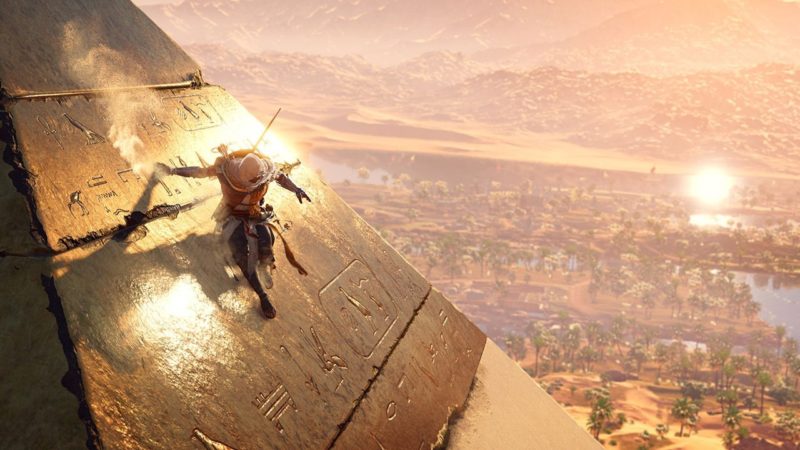The Assassin’s Creed lineage is peppered with the deaths of many faceless men and women, both figuratively and literally. Can you remember more than a half dozen of the people you’ve killed as Ezio? How about Edward? Or Altair? Me neither. Assassin’s Creed Origins differs little in that regard, but the personal tale driving your blade makes it the most exciting entry in the series since Brotherhood.
Egypt is in turmoil, caught between the encroaching Roman Republic, conflict within the country against growing Greek influence, and Cleopatra’s rising counter-coup against Ptolemy XIII. The clashing of civilisations makes for a vibrant, colourful world with some of the most visually distinct cities in the series’ 10-year history. Egyptian tradition has its back against the wall, but there are areas where it remains. Siwa is one of them, and Bayek is the embodiment of his home.
As a character, he feels like the ultimate Assassin’s Creed protagonist; he has the charm and vengeful streak of Ezio, the raw fury and force of Connor, the rebelliousness of Altair and the devotion to his home and family of all of them. But above all, he’s just an enjoyable guy, and his status as a Medjay-a sort of Egyptian sheriff-makes for a more interesting vocation than “man with a hidden blade”. His thirst for vengeance is matched only by his desire to see Egypt regain stability and prosperity.

Bayek is at times joined by his wife, Aya: a ruthless, independent and strong-willed woman, and a fully-capable assassin to boot. Her agency is proved when Bayek arrives in Alexandria, expecting to hunt down three of his targets. Instead, he finds Aya, who has already done all the hard work for him. These aren’t throwaway characters she’s dealt with; they’re the people Bayek is directly hunting, the masked men that populate the game’s ‘Targets’ screen. Their greyed-out portraits remain, a reminder of her strength and drive. She is aggressive without being truculent, a character worthy of her own game.
The two also wind up entangled in the political malaise, with Bayek becoming a dispenser of justice under Cleopatra and her allies. The scope and scale of Origins’ various narrative turns feel fragile, as though the weight of the story will collapse under itself, but it thankfully remains focused on Bayek and Aya’s personal goal throughout.
And for the first time in a while, we’ve got an Assassin’s Creed game that feels almost wholly disconnected from the rest of the franchise. Modern day presence is light and felt largely tacked-on, but not enough to get in the way like it did in Black Flag. It’s the right direction to take, but it leaves me with some questions about where the series goes from here
Where previous games struggled to fill their world with meaningful content, Origins blends Egypt as a game world and Egypt as a narrative setting in a way that seems pivotal for the series. It feels stripped back, the bloat and baggage of previous games offloaded. The resulting game falls somewhere between Horizon: Zero Dawn and The Witcher 3 in content and structure. It’s indicative of a more attentive Ubisoft-one that is, more than ever, intent on making their games last.

I can’t really stress enough how much the world is a draw for Origins-it’s huge. The first time I zoomed out, and just kept zooming, I was little scared. How on earth would I get through this game without dedicating an entire month of my life to it? Turns out, Ubisoft got smarter with their world design.
In place of the banal collectibles and chests that cluttered the maps of Unity and Syndicate, Origins provides side quests, with unique characters and stories that often wind in unexpected directions-again, a comparison to The Witcher 3 holds water. The structure of the world, its mythology and its politics all serve a sense of place and purpose. I wanted to explore, in much the same way as I wanted to explore Breath of the Wild’s Hyrule. Origins just so happens to have real history on its side.
I’m not saying all the quests are entirely independent creations, or that they’re all good. There are plenty of errand-list fetch quests with irritating characters, but they’re largely outweighed by the genuinely fantastic ones. It also falls into the morality struggle that so many games do-most things are black or white, with only a few small storylines treading shades of grey. Origins certainly won’t be looked back on for pushing the medium’s storytelling forward.
You’ll kill a lot of people in this game, and not all of it will be done with the subtlety of your hidden blade. The entire combat system has been replaced with something mimicking Dark Souls, with light and heavy attacks, dodges, blocks and parries. It’s functional but floaty and lacks the flow of previous games. I couldn’t stop thinking about Assassin’s Creed 3 as I played. That game’s combat had a forcefulness and creativity to it where the other games had a dance-like fluidity. That kind of punch would’ve suited Bayek’s character.

Backing up the combat is an all-new progression system. Near enough everything you do will reward XP, granting you levels and skill points, allowing you to move through one of three trees: warrior, seer and hunter. You’re not locked into any of them once you start, and you can eventually start pumping unlimited skill points into buffing your damage. But the skill tree is a predictable slog. Instead of tailoring these new systems toward being good incarnations of those systems, it feels like Ubisoft have tried to find a compromise between games that do them well and the Assassin’s Creed franchise.
You’ll also start acquiring rarer, more powerful gear with unique modifiers. This isn’t Diablo though, and the attachment I felt to my equipment wasn’t the same. Most of the equipment you find in the world will be terrible, and only the trickier quests and enemies have a chance of dropping a decent reward. Fortunately, a bad piece of loot isn’t the end of the world, and unwanted equipment isn’t without its uses. Everything can either be dismantled for crafting parts or sold. The former is arguably more important, as those materials feed directly into upgrading your hidden blade, tool pouches and armour. And while money didn’t have much use in my experience (you’ll find no Ezio-era property management here), it made collecting every item I saw a little more worthwhile.
The vast sands of Egypt present a beauty that few games match, a beauty that makes exploring and seeing all the world’s vistas its own reward. The lighting and water effects are second to none, though character models that aren’t important to the story are far less detailed than, say, Bayek and Aya. It also runs pretty great, even on my ageing laptop. Despite being very CPU-intensive, I was able to get a consistent 30fps at 1080p on a 6700HQ and 970m. The four-year development on this one shows, and the work put into the Egyptian setting is stunning.
I played a lot more of Assassin’s Creed Origins than I ever thought I would. Egypt is the most interesting world Ubisoft have crafted in years, and it has a story with character and flair to bring it to life. The combat and progression let it down a little, but the ways the formula has been tweaked-or thrown out entirely-make for a really intriguing, beautiful and shockingly likeable game.




